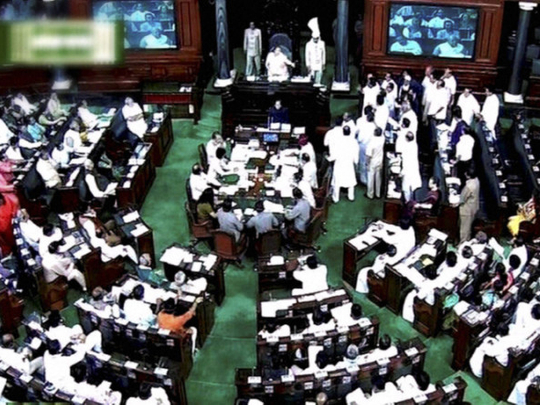
The world has really shrunk. The surge of images and sound across time zones and continents through television, computer or handset screens moulds public opinion internationally about what’s happening anywhere on earth. Nothing is localized any more.
So I was hardly surprised when at the height of the Gaza genocide the entire opposition in parliament tore into the Narendra Modi-led Bharatiya Janata Party government for purchasing arms from Israel. Parties cutting across political lines, barring those belonging to the BJP-led National Democratic Alliance (NDA), exposed how remittances from millions of Indians employed in West Asia — accounting for over 50 per cent of India’s foreign exchange earnings — were being used to pay for Israeli military exports, funds which Tel Aviv was using to kill children and women in Gaza.
The united stand by opposition lawmakers forced Modi’s hand. He didn’t clamp a ban on defence imports from Israel but his admiration for the Jewish state notwithstanding, Modi instructed India’s permanent representative in United Nations to vote for the July 24 UN Human Rights Council (UNHRC) resolution demanding a probe into Israel’s Gaza offensive and condemning Tel Aviv’s disproportionate use of force.
Evidently, the BJP’s thumping poll victory followed by Modi’s appointment as prime minister has unified India’s disparate opposition parties. After a lot of soul-searching, they are increasingly operating as a single unit, presenting a united front and pursuing a coordinated agenda as they did in the case of Israeli aggression in Gaza. What’s more, a galvanized united opposition has become a source of concern for the BJP.
But the opposition’s newfound unity will soon be tested in the country’s two most politically important provinces. In Bihar, erstwhile sworn enemies Janata Dal-United (JD-U), Rashtriya Janata Dal (RJD) and Congress Party have formally entered into an alliance to take on the BJP-led front in by-elections for 10 state legislative assembly seats scheduled for August 21. In Uttar Pradesh, another make-or-mar state, bitter rivals Samajwadi Party (SP), Bahujan Samaj Party (BSP) and Congress Party have clinched an informal deal to defeat the BJP in by-elections for a dozen state legislative assembly seats and a Lok Sabha (lower house of parliament) constituency.
Not surprisingly, new electoral pacts between political parties which fought each other even in the April-May parliamentary polls, forged with the sole objective of thwarting the BJP, are being described in colloquial Hindi as marta kya nahi karta (the dying will do anything) and baarh mein sanp aur newla ek hi gach par charh jata hai jan bachane ko (snake and mongoose seek refuge in the same tree when threatened by rising flood waters)!
Battered and shaken by the BJP blitzkrieg, RJD’s Lalu Prasad Yadav and JD-U’s Nitish Kumar – former Bihar chief ministers who were not on talking terms for 17 long years - decided to sink their differences for survival sake. In Uttar Pradesh, former chief ministers Mulayam Singh Yadav who heads SP and BSP boss Mayawati have pledged to take on the BJP unitedly. A marginalized Congress has thrown its weight behind new coalitions in the two states.
Bihar (40) and Uttar Pradesh (80) account for as many as 120 seats in the 543-strong Lok Sabha. They witnessed four-cornered contests in the April-May parliamentary polls. In Bihar the contestants were BJP-led NDA, Congress, JD-U and RJD, while in Uttar Pradesh BJP-led NDA, Congress, SP and BSP slugged it out. In Bihar, NDA bagged 31 seats (BJP 22), RJD four, JD-U and Congress two each and the Nationalist Congress Party (NCP), a Congress ally, one. In Uttar Pradesh, the NDA walked away with 73 seats (BJP 71), SP and Congress won five and two respectively while BSP drew a blank.
After the drubbing, the non-NDA parties have realized the importance of fighting the NDA unitedly. Vote-share of various parties proved to be the eye-opener. In Bihar, the NDA polled 38.8 percent of the votes (BJP accounted for 29.4 percent). The RJD’s vote percentage was 20.1, JD-U 15.8 percent and Congress 8.4 percent; the combined vote-share of the three was obviously much more than the NDA’s. Similarly, in Uttar Pradesh, Congress, SP and BSP together polled 49.3 percent votes compared to the BJP-led NDA’s 42.3 percent.
The opposition has a clear statistical advantage over BJP. And if the opposition’s strategy of pooling their sizeable vote-banks bears fruit in the by-elections, the next assembly elections in Bihar and Uttar Pradesh will become an insurmountable problem for the BJP. Invariably, leadership issues will crop up in the near future. RJD, JD-U, SP and BSP leaders who are known for their king or queen-sized egos, will have to make compromises. Let’s not forget that all of them nursed prime ministerial ambitions! But they will surely prefer adjustments among themselves to political oblivion when the time comes to make hard choices.
The Urdu word for two classical musicians performing together on the stage is jugalbandi. The Yadav-Kumar jugalbandi was evident during the June elections to the Rajya Sabha, or upper house of parliament. Thanks to the support extended by Yadav’s RJD lawmakers in the Bihar legislative assembly, JD-U’s Rajya Sabha nominees won hands down defeating BJP-backed independents by big margins.
The Congress is now banking on anti-BJP parties to bag the Leader of Opposition (LoP) post in the new parliament as it has only 44 MPs whereas at least 53 MPs are required to get the prized post which is equivalent to a cabinet minister. The Congress’s interpretation of the rule is that although it doesn’t have the requisite numbers on its own, it’s entitled to the post by virtue of being the biggest opposition party enjoying the backing of smaller opposition parties. If the Speaker buys the Congress argument, it will be a major victory for the entire opposition which genuinely wants Sonia Gandhi as LoP.
S. N. M. Abdi is a noted Indian journalist and commentator.








